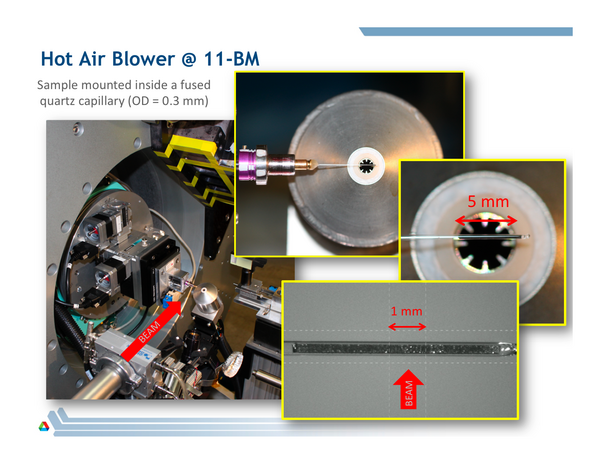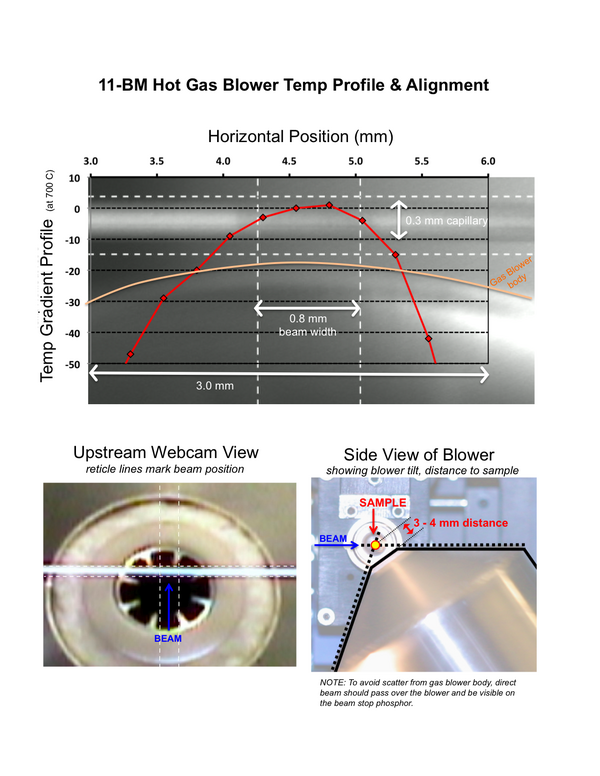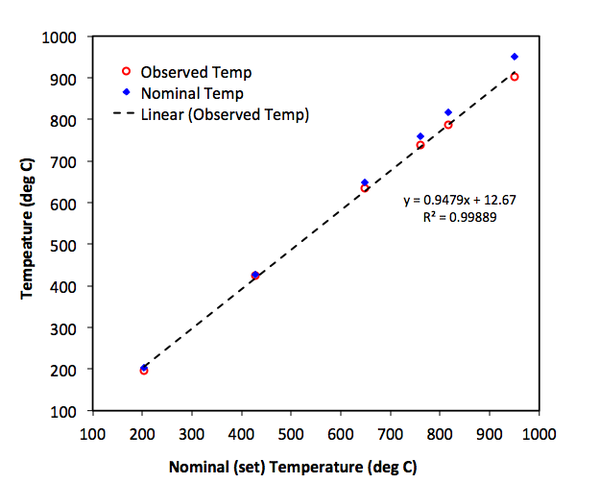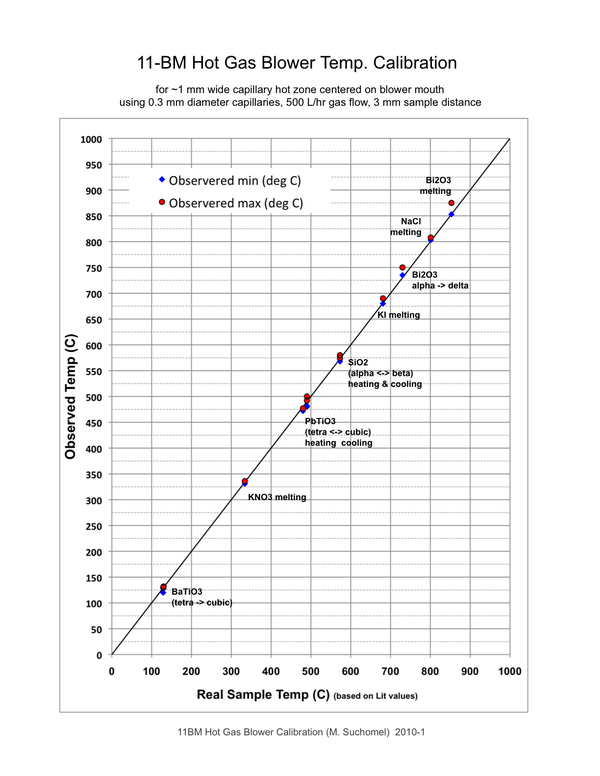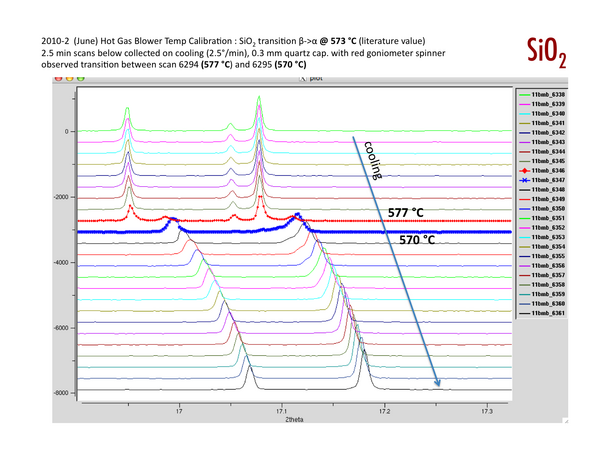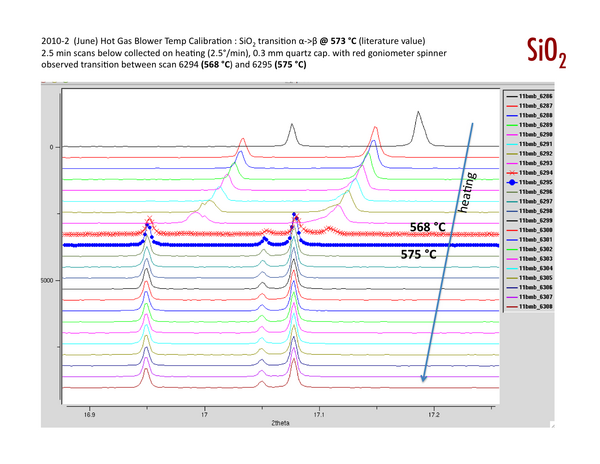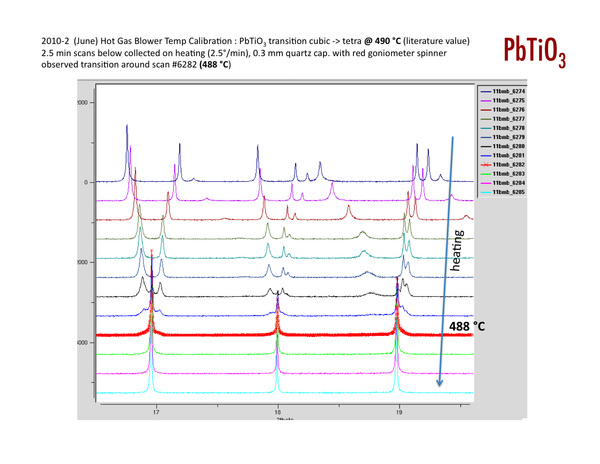Difference between revisions of "Hot Gas Blower (Cyberstar)"
| Line 28: | Line 28: | ||
Full powder diffraction patterns were collected for select "nominal" set temperatures between 100 - 950 C at 11-BM using a 0.5 mm diameter fused quartz capillary packed with Al2O3 powder ([https://wiki-ext.aps.anl.gov/ug11bm/index.php/NIST_SRM_Certificates NIST SRM 676a]). | Full powder diffraction patterns were collected for select "nominal" set temperatures between 100 - 950 C at 11-BM using a 0.5 mm diameter fused quartz capillary packed with Al2O3 powder ([https://wiki-ext.aps.anl.gov/ug11bm/index.php/NIST_SRM_Certificates NIST SRM 676a]). | ||
Refinements were performed against data from each nominal temperature to determine ''a'' & ''c'' unit cell parameters. | Refinements were performed against data from each nominal temperature to determine '''''a''''' & ''c'' unit cell parameters. | ||
Based on the initial room temperature 25 C lattice values and published thermal expansion equations (<small>J. Appl. Cryst. (1993). 26, 77-81 </small>), "real" observed sample temperatures were then calculated independently for each set of 'a'' & ''c'' unit cell terms. | Based on the initial room temperature 25 C lattice values and published thermal expansion equations (<small>J. Appl. Cryst. (1993). 26, 77-81 </small>), "real" observed sample temperatures were then calculated independently for each set of 'a'' & ''c'' unit cell terms. | ||
Revision as of 16:33, 25 September 2012
About
11-BM has a dedicated Cyberstar Hot Gas Blower. This can be used to heat small diameter capillary samples from ambient temperature to ~ 950 °C
About
Temperature Range and Ramp Rate.
- ambient temperature to ~ 950 °C
- Max ramp rate on heating & cooling is 5 deg C/min (300 C/hour)
Users should plan experiments to incorporate these heating and cooling ramp times.
11-BM Hot Gas Blower Image
Temperature Profile & Alignment
Temperature Calibration
Al2O3 Thermal Expansion
In-situ calibration of the hot gas blower was performed using the known thermal expansion of Al2O3 alumina a & c unit cell parameters as a function of temperature.
Full powder diffraction patterns were collected for select "nominal" set temperatures between 100 - 950 C at 11-BM using a 0.5 mm diameter fused quartz capillary packed with Al2O3 powder (NIST SRM 676a).
Refinements were performed against data from each nominal temperature to determine a & c unit cell parameters.
Based on the initial room temperature 25 C lattice values and published thermal expansion equations (J. Appl. Cryst. (1993). 26, 77-81 ), "real" observed sample temperatures were then calculated independently for each set of 'a & c unit cell terms.
Approximate room-temperature lattice parameters are:
a = 4.7592 A c = 12.9934 A
The thermal expansion equation used for the a axis of Al203 (range 293-1900 K) is:
delta(a)/a (%) = -0.176 + (5.431E-4 * T) + (2.150-7 * T^2) - (2.810E-11 * T^3) (T/K)
The thermal expansion equation used for the c axis of Al203 (range 293-1900 K) is:
delta(c)/c (%) = -0.192 + (5.927E-4 * T) + (2.142E-7 * T^2) - (2.207E-11 * T^3) (T/K)
Finally, plotting observed vs nominal set temperatures for the Al2O3 data gives a correction curve and equation for other hot air blower measurements at 11-BM under similar experimental conditions.
These results (from July 2012) are shown below. These calibration data are kindly shared by Jae-Hyuk Her, GE Global Research.
Corrected temperature values calculated from calibration equation: T_observed(K) = 0.9479*T_nominal(K) + 12.67 Nominal (Set) Observed Set - Obs deg C deg K deg C deg K deg 25 298 25 295 0 100 373 93 366 -7 200 473 188 461 -12 300 573 283 556 -17 400 673 378 651 -22 500 773 472 745 -28 600 873 567 840 -33 700 973 662 935 -38 800 1073 757 1030 -43 900 1173 852 1125 -48 950 1223 899 1172 -51
Phase Transitions
The temperature calibration of the hot gas blower was also studied using in-situ diffraction measurements of several known phase transitions. These results (from ~ 2011) are posted below.
